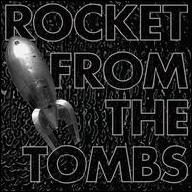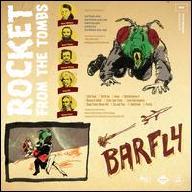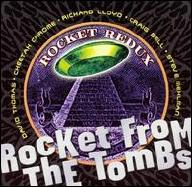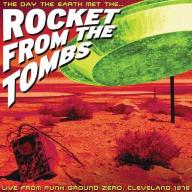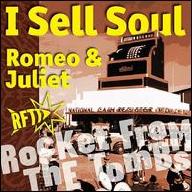Playing high-energy rock influenced by the Stooges and Lou Reed (Laughner's hero), RFTT made a name for itself in the Cleveland club scene, as well as opening for touring thud-rock has-beens like Iron Butterfly. The songs were sharp and acerbic, a worm's-eye view of an entropic Cleveland, an urban area that was then a dying industrial city. Songs like "Life Stinks" and "Thirty Seconds Over Tokyo" (both later recorded by Pere Ubu) were indicative of the boredom, anomie, and restlessness felt by the city's pre-punk punks. A mercurial band given to constant internal conflict, Rocket from the Tombs was a group always at odds with itself. One example was the Crocus Behemoth issue; outside of Laughner, no one else in the band could stand his singing (or non-singing, as the case may be). Compounding this were Laughner and Behemoth's arty proclivities, which clashed with the hard rock/heavy metal direction preferred by the rest of the band. In 1975, a scrawny, Iggy-worshiping kid from Youngstown, Ohio named Stiv Bators came to Cleveland and was tried out as lead singer, but he didn't last. Laughner, meanwhile, had met and become friendly with influential rock scribe and fellow gonzo Lester Bangs after sending Bangs a Rocket demo tape that he reviewed favorably for Creem. Soon Laughner was writing for Creem and traveling to New York for a first-hand look at the punk scene at CBGB. Blown away by Patti Smith and especially Television, Laughner returned to Cleveland only to find that the issue of musical direction was tearing RFTT apart. Within weeks, the band was no more.
Laughner and Behemoth (who at this point was going by his birth name, David Thomas) began Pere Ubu, while Gene O'Connor (then called Cheetah Chrome) and Johnny Madansky (then Johnny Blitz) had wisely remembered to keep Bators' phone number; they called him up and formed the wonderfully scuzzy Dead Boys. Laughner's time as a member of Pere Ubu was short, and by 1976 he was fronting a series of new bands, among them Friction, the Finns, and Peter the Wolves. Despite this flurry of creativity, which included a good chunk of writing for Creem, Laughner was fueling a substance abuse problem that had reached critical mass, and by 1977 he was dead of liver failure at the age of 25. Both Pere Ubu and the Dead Boys went on to have respectable careers (Ubu more so than the Boys), but the sad legacy of Rocket from the Tombs is that of Peter Laughner, an extremely talented man who didn't live long enough to see his talent rewarded. Over 25 years after their initial demise, surviving members Thomas, Chrome, and Bell -- bolstered by Television's Richard Lloyd, Laughner's replacement, and Pere Ubu drummer Steve Mehlman, sitting in for Madansky -- defied the odds by regrouping for an exhilarating June 2003 tour, documented on Rocket Redux. In 2010, this same lineup reconvened in Cleveland for recording sessions. The results were released a year later as Barfly.
By the time Barfly was released, tensions within RFTT began to boil over, something Thomas unwittingly predicted when the group set out on its first reunion tour, when he quipped to journalists that fans should see the group as soon as possible because the lineup wasn't likely to last. Shortly after Barfly came out, Richard Lloyd left the group, and Cheetah Chrome suddenly and unexpectedly bowed out immediately after the last date of a tour in December 2011. Gary Siperko, a Cleveland-based guitarist who worked with the Mofos and the Whiskey Daredevils, took over the Laughner/Lloyd slot in the group, and Buddy Akita, another Clevelander and a member of This Moment in Black History, replaced Chrome. The new edition of Rocket from the Tombs toured Europe in 2012, and in 2015 they set out on an international tour in support of a new album, Black Record. ~ John Dougan, Rovi


